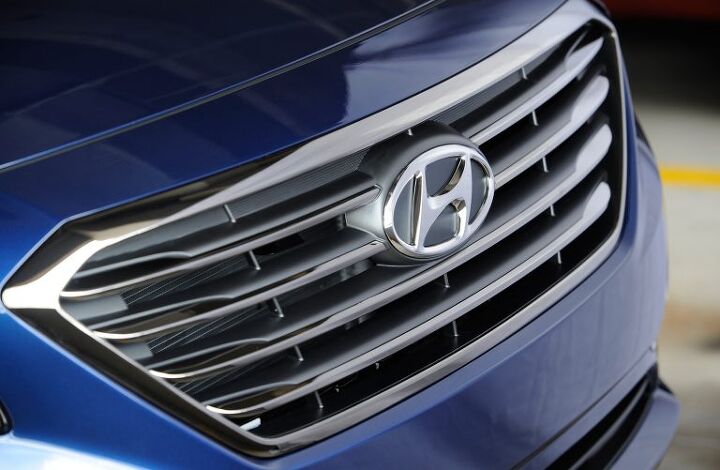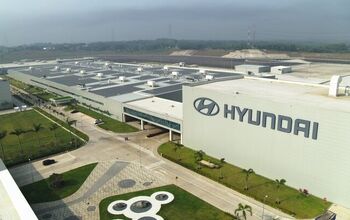Report: Hyundai May Choose Georgia for EV Plant

Hyundai Motor Group has been considering where to establish its planned EV manufacturing hub for the United States for roughly a year now and is reportedly zeroing in on the State of Georgia as a final destination. It’s even said to have conducted some preliminary meetings with local leaders about the possibility of breaking ground in an area that could be strategically aligned with its existing facilities – namely Montgomery’s Hyundai Motor Manufacturing Alabama (HMMA) and West Point’s Kia Motors Manufacturing Georgia (KMMG).
Reuters broke the story, citing the usual unnamed sources that are “familiar with the matter.” While the automaker has confirmed that it has a loose plan in place for its upcoming EV pant, it’s been unwilling to share any specifics regarding the possibility of future investments.
From Reuters:
The new Georgia EV facility, if it is finalized, would serve both Hyundai and Kia as the brands move to roll out a pair of fully electric SUVs – the Ioniq 7 and EV9 – aimed at the U.S. market, the three people with knowledge of the plans told Reuters.
Georgia’s Economic Department declined to comment. “We do not comment on speculation about economic development projects,” said a state economic development department spokesperson.
The announcement of an investment deal by Hyundai would come at a time when the administration of President Joe Biden has been pushing for more investment in EVs and related suppliers to create jobs and drive a clean-energy agenda. It would also mark a major economic development win for Georgia, which has pushed to establish itself as a regional hub for the emerging EV industry.
The Korean car company has been pouring cash into the region, with the most recent investment being last month’s $300-million push to manufacture the Genesis GV70 EV and a hybrid version of the Santa Fe in Alabama. SK Innovation (Hyundai’s chief battery supplier) has also been expanding in Georgia, tossing more than $2 billion into two planned facilities. But the entire Southeastern region is quickly becoming a haven for battery plants, with CATL, LG Energy Solution, and Samsung SDI having made investments of their own.
Reuters speculated that a formal announcement could arrive shortly before the May 24th Georgia primary election in which Republican Governor Brian Kemp is being challenged by former U.S. Senator David Perdue – suggesting a final decision may hinge on the political climate. It likewise noted that Hyundai had been hoping to announce its U.S. investment in electric vehicle manufacturing later this month to coincide with Biden’s planned visit to South Korea, citing another unnamed person with knowledge of the overarching strategy.
The Biden administration has said it will allocate more than $3 billion in funding that would have gone to support U.S. infrastructure to help finance domestic EV manufacturing. Biden’s ultimate goal is to have half of all vehicles sold within the nation to be electric by 2030.
Meanwhile, local outlets have been musing what the new facility could mean in terms of jobs – with the Atlanta Journal-Constitution reporting that the company plans to hire 8,500 people to work at a site planned along I-16 in Bryan County, near Savannah.
[Image: Hyundai]

A staunch consumer advocate tracking industry trends and regulation. Before joining TTAC, Matt spent a decade working for marketing and research firms based in NYC. Clients included several of the world’s largest automakers, global tire brands, and aftermarket part suppliers. Dissatisfied with the corporate world and resentful of having to wear suits everyday, he pivoted to writing about cars. Since then, that man has become an ardent supporter of the right-to-repair movement, been interviewed on the auto industry by national radio broadcasts, driven more rental cars than anyone ever should, participated in amateur rallying events, and received the requisite minimum training as sanctioned by the SCCA. Handy with a wrench, Matt grew up surrounded by Detroit auto workers and managed to get a pizza delivery job before he was legally eligible. He later found himself driving box trucks through Manhattan, guaranteeing future sympathy for actual truckers. He continues to conduct research pertaining to the automotive sector as an independent contractor and has since moved back to his native Michigan, closer to where the cars are born. A contrarian, Matt claims to prefer understeer — stating that front and all-wheel drive vehicles cater best to his driving style.
More by Matt Posky
Latest Car Reviews
Read moreLatest Product Reviews
Read moreRecent Comments
- Jalop1991 In a manner similar to PHEV being the correct answer, I declare RPVs to be the correct answer here.We're doing it with certain aircraft; why not with cars on the ground, using hardware and tools like Telsa's "FSD" or GM's "SuperCruise" as the base?Take the local Uber driver out of the car, and put him in a professional centralized environment from where he drives me around. The system and the individual car can have awareness as well as gates, but he's responsible for the driving.Put the tech into my car, and let me buy it as needed. I need someone else to drive me home; hit the button and voila, I've hired a driver for the moment. I don't want to drive 11 hours to my vacation spot; hire the remote pilot for that. When I get there, I have my car and he's still at his normal location, piloting cars for other people.The system would allow for driver rest period, like what's required for truckers, so I might end up with multiple people driving me to the coast. I don't care. And they don't have to be physically with me, therefore they can be way cheaper.Charge taxi-type per-mile rates. For long drives, offer per-trip rates. Offer subscriptions, including miles/hours. Whatever.(And for grins, dress the remote pilots all as Johnnie.)Start this out with big rigs. Take the trucker away from the long haul driving, and let him be there for emergencies and the short haul parts of the trip.And in a manner similar to PHEVs being discredited, I fully expect to be razzed for this brilliant idea (not unlike how Alan Kay wasn't recognized until many many years later for his Dynabook vision).
- B-BodyBuick84 Not afraid of AV's as I highly doubt they will ever be %100 viable for our roads. Stop-and-go downtown city or rush hour highway traffic? I can see that, but otherwise there's simply too many variables. Bad weather conditions, faded road lines or markings, reflective surfaces with glare, etc. There's also the issue of cultural norms. About a decade ago there was actually an online test called 'The Morality Machine' one could do online where you were in control of an AV and choose what action to take when a crash was inevitable. I think something like 2.5 million people across the world participated? For example, do you hit and most likely kill the elderly couple strolling across the crosswalk or crash the vehicle into a cement barrier and almost certainly cause the death of the vehicle occupants? What if it's a parent and child? In N. America 98% of people choose to hit the elderly couple and save themselves while in Asia, the exact opposite happened where 98% choose to hit the parent and child. Why? Cultural differences. Asia puts a lot of emphasis on respecting their elderly while N. America has a culture of 'save/ protect the children'. Are these AV's going to respect that culture? Is a VW Jetta or Buick Envision AV going to have different programming depending on whether it's sold in Canada or Taiwan? how's that going to effect legislation and legal battles when a crash inevitibly does happen? These are the true barriers to mass AV adoption, and in the 10 years since that test came out, there has been zero answers or progress on this matter. So no, I'm not afraid of AV's simply because with the exception of a few specific situations, most avenues are going to prove to be a dead-end for automakers.
- Mike Bradley Autonomous cars were developed in Silicon Valley. For new products there, the standard business plan is to put a barely-functioning product on the market right away and wait for the early-adopter customers to find the flaws. That's exactly what's happened. Detroit's plan is pretty much the opposite, but Detroit isn't developing this product. That's why dealers, for instance, haven't been trained in the cars.
- Dartman https://apnews.com/article/artificial-intelligence-fighter-jets-air-force-6a1100c96a73ca9b7f41cbd6a2753fdaAutonomous/Ai is here now. The question is implementation and acceptance.
- FreedMike If Dodge were smart - and I don't think they are - they'd spend their money refreshing and reworking the Durango (which I think is entering model year 3,221), versus going down the same "stuff 'em full of motor and give 'em cool new paint options" path. That's the approach they used with the Charger and Challenger, and both those models are dead. The Durango is still a strong product in a strong market; why not keep it fresher?


































Comments
Join the conversation
Hyundai/Kia is trying to become the next Honda. More manufacturing jobs in the U.S. is a good thing. Isn't it funny how many foreign brands are made in America, and how many American vehicles are made in Mexico and other countries?
They aimed for Honda but landed on Infiniti/Acura/Cadillac